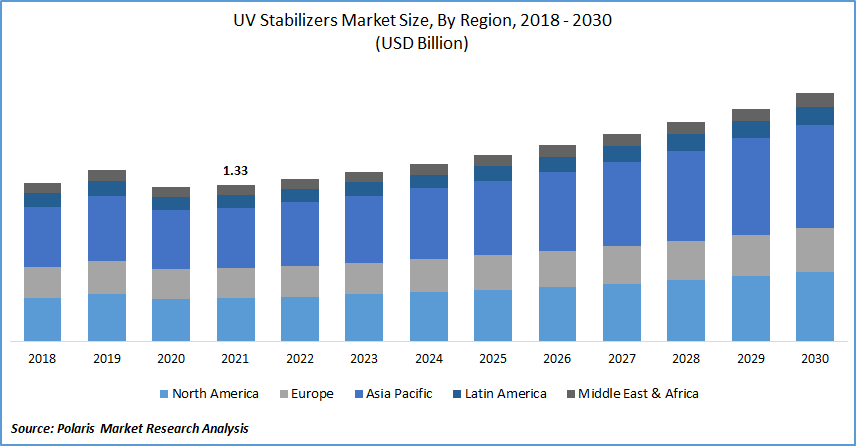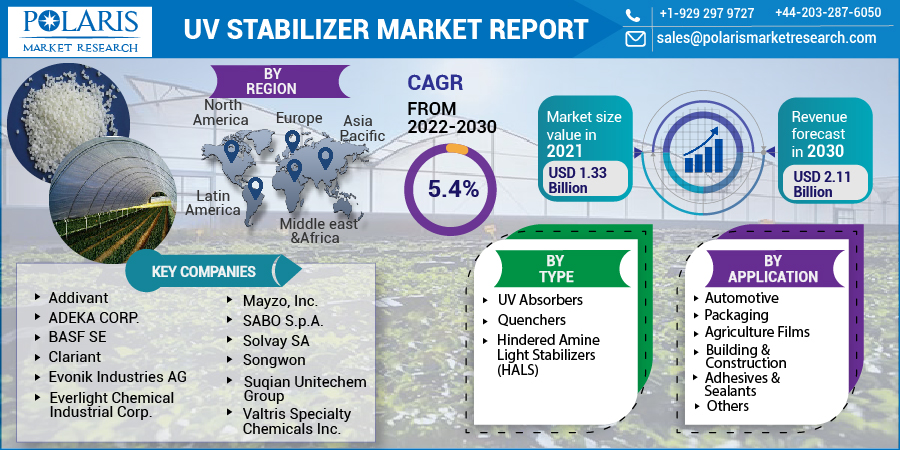
UV Stabilizers Market Share, Size, Trends, Industry Analysis Report, By Type (Hindered Amine Light Stabilizers (HALS), UV Absorbers, Quenchers); By Application; By Region; Segment Forecast, 2022 - 2030
- Published Date:May-2022
- Pages: 112
- Format: PDF
- Report ID: PM2400
- Base Year: 2021
- Historical Data: 2018 - 2020
Report Outlook
The global UV stabilizers market was valued at USD 1.33 billion in 2021 and is expected to grow at a CAGR of 5.4% during the forecast period. Factors such as the growing need for improved, scratch-resistant, UV-resistant, non-deteriorating, and rising awareness about UV light's harmful effects on plastics are driving the global UV stabilizers market.
 Know more about this report: Request for sample pages
Know more about this report: Request for sample pages
UV stabilizers come in various forms, including HALS, UV absorbers, and quenchers. The most popular type of ultraviolet stabilizer is HALS. The infrared spectrum, visible spectrum, and ultraviolet spectrum are the three components of light. The UV spectrum is electromagnetic radiation with a shorter wavelength than visible light but greater than soft X-rays.
The biological and chemical effects of ultraviolet light on the environment are numerous. UV light causes polymer materials to crack, chalk, change color, and lose some of their physical qualities. The fading of plastic colorants is also accelerated by UV light. As a result, polymer materials lose their physical attributes and become bland. As a result, the market demand for UV stabilizers rises to help these polymer materials last longer.
Industry Dynamics
Growth Drivers
Demand is increasing in the packaging market due to its various benefits, such as improved product durability and UV protection, driving the UV stabilizers market growth during the forecast period. UV stabilizers can help packaging materials retain their quality and durability after exposure to sunshine and harsh weather conditions. The last longing for the durability of the packaging materials primarily drives the market. These stabilizers are widely used in packaging food, beverages, other consumer goods, and cosmetics.
UV radiation can degrade food & beverage packaging, pharmaceutical items, housekeeping, cosmetics, and personal care products, causing food color fading, faster oxidation of oils and fats, and vitamin content loss in fruit juices and milk. Ultraviolet stabilizers protect plastic packaging and its contents against the sun's harmful effects of ultraviolet and infrared radiation. Polyethylene terephthalate (PET) packaging is rising in the food & beverage business. The need for barrier PET bottles that provide ultraviolet protection is increasing.

Know more about this report: Request for sample pages
Report Segmentation
The market is primarily segmented based on type, application, and region.
|
By Type |
By Application |
By Region |
|
|
|
Know more about this report: Request for sample pages
Insight by Type
Based on the type segment, the Hindered Amine Light Stabilizers (HALS) segment is expected to be the most significant revenue contributor in the global UV stabilizers market in 2021 and is expected to retain its dominance in the foreseen period. Ultraviolet stabilizers known as hindered amine light stabilizers (HALS) can protect plastic and polymer products of any thickness. HALS, unlike ultraviolet absorbers, do not absorb ultraviolet rays; instead, they prevent polymer degradation by continuously and cyclically eliminating free radicals generated by photo-oxidation. HALS is used in plastic packaging, coatings, shipping sacks, and agricultural films to resist photodegradation.
Geographic Overview
In terms of geography, North America had the largest ultraviolet stabilizers market revenue share. The attributable factor for the dominance is the presence of well-established automakers, as ultraviolet stabilizers are used extensively in the automotive market.
The manufacturing of automobiles is expected to expand in the coming years, resulting in an increased need for ultraviolet stabilizers in the automotive market during the forecast period. Plastic is widely utilized as a packaging material in various key end-user sectors, from food & beverage to PET bottles and containers. The Food and Drug Administration in the U.S. oversees food packaging safety, particularly polymers that come into contact with food.
Moreover, Asia Pacific is expected to witness a high CAGR in the global UV stabilizers market. The packaging market in China is growing due to the fast rate of technological improvement and R&D efforts in the food packaging market, where there is a significant market demand for safer and cleaner packaging goods.
Due to the urbanization trend in China, food packaging has become an essential component of daily living. The majority of the country's population lives in cities, which lack the land and environment necessary for agricultural development. As a result, the market demand for processed and packaged foods is increasing.
Competitive Insight
Some of the major players operating in the global market include Addivant, ADEKA CORP., BASF SE, Clariant, Everlight Chemical Industrial Corp., Evonik Industries AG, Mayzo, Inc., SABO S.p.A., Solvay SA, Songwon, Suqian Unitechem Group, and Valtris Specialty Chemicals Inc.
UV Stabilizers Market Report Scope
|
Report Attributes |
Details |
|
Market size value in 2021 |
USD 1.33 Billion |
|
Revenue forecast in 2030 |
USD 2.11 Billion |
|
CAGR |
5.4% from 2022 - 2030 |
|
Base year |
2021 |
|
Historical data |
2018 - 2020 |
|
Forecast period |
2022 - 2030 |
|
Quantitative units |
Revenue in USD billion and CAGR from 2022 to 2030 |
|
Segments covered |
By Type, By Application, By Region |
|
Regional scope |
North America, Europe, Asia Pacific, Latin America; Middle East & Africa |
|
Key Companies |
Addivant, ADEKA CORP., BASF SE, Clariant, Everlight Chemical Industrial Corp., Evonik Industries AG, Mayzo, Inc., SABO S.p.A., Solvay SA, Songwon, Suqian Unitechem Group, and Valtris Specialty Chemicals Inc. |
